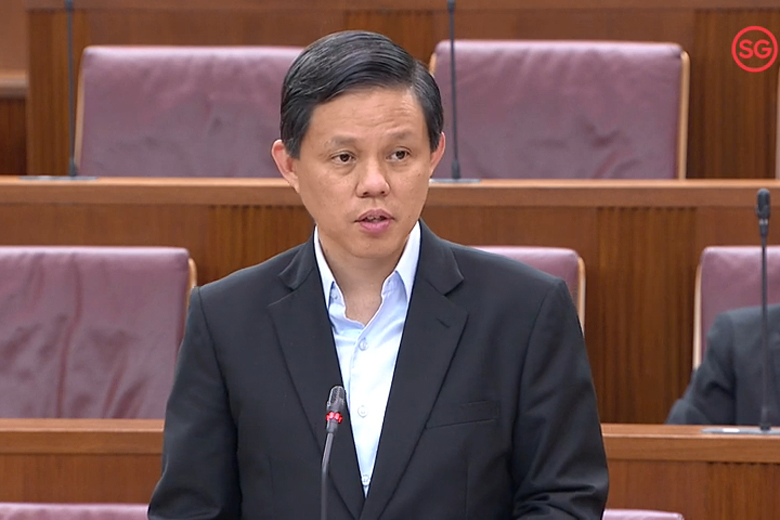Parliament: Singapore to upgrade trade pacts to secure opportunities for local firms, cater to new business models
Sign up now: Get ST's newsletters delivered to your inbox

Minister for Trade and Industry Chan Chun Sing gave an overview in Parliament on Monday (March 4) of how the authorities intend to prepare the Republic for its next stage of growth.
PHOTO: GOV.SG
Seow Bei Yi
Follow topic:
SINGAPORE - Singapore plans to upgrade its trade pacts to secure better access to overseas markets for its businesses and people, and cater to new business models, Minister for Trade and Industry Chan Chun Sing said on Monday (March 4).
It will also expand its network of free trade agreements (FTAs) to help Singapore companies enter more economies, and help diversify the country's markets and supply chains.
"We must expand our network of FTAs to give our companies privileged access to more markets vis-a-vis our competitors. This ensures the diversification of our markets and supply chains; to not overly rely on any one particular market," said Mr Chan.
He added: "We are also broadening our reach by looking into FTAs with the Eurasian Economic Union, the Pacific Alliance, and the Southern Common Market in South America (Mercosur).
"For the longer term, we must increasingly take up opportunities in emerging markets by familiarising ourselves with the culture, regulations and business networks in regions that are newer to us."
In his speech addressing MPs' questions and suggestions on the budget for the Ministry of Trade and Industry in 2019, Mr Chan gave an overview of how the authorities intend to prepare the Republic for its next stage of growth.
Apart from enhancing its FTA network to deepen and diversify links to other markets, other aspects of Singapore's strategy include transforming industries to seize new opportunities, strengthening capabilities of enterprises and workers, and enabling more agile regulations to have a more pro-business environment that can empower firms and consumers.
Singapore's trade with its FTA partners accounts for 92 per cent of its total trade in goods and services, Mr Chan said, in response to Mr Teo Ser Luck (Pasir Ris-Punggol GRC) who had asked how businesses have benefited from the pacts and how they can be helped to tap these more.
Companies here also had tariff savings of about $730 million in 2016, up from $450 million a decade before, he added, noting that such savings are a key benefit from signing FTAs.
"Since 2016, about 1,800 companies have benefited each year from Enterprise Singapore's efforts to build awareness of our network of trade agreements and its benefits," he said, referring to outreach sessions and specific assistance requested from the trade promotion agency.
Mr Chan added that the ministry will continue working with the Singapore Business Federation and the trade associations and chambers to help companies benefit from the FTAs.
He noted that during its chairmanship of Asean last year, Singapore completed several initiatives to make the region a more attractive business and investment destination.
This included having the Asean Single Window in place, under which five Asean countries are now exchanging trade documents electronically, with the remaining countries coming on board this year. An Asean agreement on e-commerce was also inked, among others.
Other developments include the entry into force of the Comprehensive and Progressive Agreement for Trans-Pacific Partnership last year - Singapore's first trade pact with Canada and Mexico - and the European Parliament's approval of the European Union-Singapore FTA earlier this year.
Singapore's trade agreements complement efforts by the Republic and like-minded partners to evolve international rules and uphold the rules-based multilateral trading system embodied in the World Trade Organisation, Mr Chan added.
Singapore is actively working with like-minded WTO members, including recently convening an e-commerce joint statement to help reduce cross-border hurdles on this front, and welcomes further collaboration to push the envelope on digital trade.
In his speech, Mr Chan also outlined Singapore's challenges, including uncertainties of the United States-China trade relations in the near term and shifts in global trade patterns and production chains in the medium term.
In the longer term, Singapore should carefully watch developments in international taxation, which will shape the Republic's future attractiveness as a choice business location.
"If we get our fundamentals right, we can further distinguish ourselves and attract global investors to come here and create better jobs for Singaporeans," he said.
These fundamentals, he noted, must include effective governance founded on long-term political stability and planning; a global mindset; competitive advantage in innovation, creativity and standards; and a skilled workforce with an emphasis on continuous training and lifelong learning.

